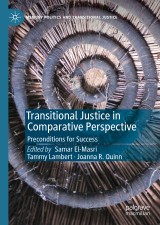Details

Transitional Justice in Comparative Perspective
Preconditions for SuccessMemory Politics and Transitional Justice
|
106,99 € |
|
| Verlag: | Palgrave Macmillan |
| Format: | |
| Veröffentl.: | 17.01.2020 |
| ISBN/EAN: | 9783030349172 |
| Sprache: | englisch |
Dieses eBook enthält ein Wasserzeichen.
Beschreibungen
What if we could change the conditions in post-conflict/post-authoritarian countries to make transitional justice work better? This book argues that if the context in countries in need of transitional justice can be ameliorated before processes of transitional justice are established, they are more likely to meet with success. As the contributors reveal, this can be done in different ways. At the attitudinal level, changing the broader social ethos can improve the chances that societies will be more receptive to transitional justice. At the institutional level, the capacity of mechanisms and institutions can be strengthened to offer more support to transitional justice processes. Drawing on lessons learned in Colombia, Democratic Republic of the Congo, The Gambia, Lebanon, Palestine, and Uganda, the book explores ways to better the conditions in post-conflict/post-authoritarian countries to improve the success of transitional justice.
<div>1 Changing the Context: Can conditions be created that are more conducive to transitional justice success?.- 2 Tractionless Transitional Justice in Uganda: The Potential for Thin Sympathetic Interventions as Ameliorating Factor.- 3 The Role of Democratic Uncertainty in the Interplay between Transitional Justice and Democratisation.- 4 The Importance of Modifying the Context Before Introducing Amnesty and Prosecutions: The Case of Lebanon.- 5 Victims of Language: Language as a Pre-Condition of Transitional Justice in Colombia’s Peace Agreement.- 6 Transitional Justice in the Wake of Resource Wars.- 7 “Some Reasons Are Obvious, Some Are not.” The Gambian Experience with Transitional Justice.- 8 Institutional Trustworthiness, Transformative Judicial Education and Transitional Justice: A Palestinian Experience.- 9 Moving Forward: The possibilities that obtain from ameliorating the context to create conditions for success.</div><div><br></div>
<div><div><b>Samar El-Masri </b>is Adjunct Professor at both the Centre for Transitional Justice and Post-Conflict Reconstruction at The University of Western Ontario and the Faculty of Graduate Studies at Dalhousie University, Canada. </div><div><br></div><div><b>Tammy Lambert</b> is Researcher in Political Science and Transitional Justice and Post-Conflict Reconstruction at The University of Western Ontario. </div><div><br></div><div><b>Joanna R. Quinn</b> is Director of the Centre for Transitional Justice and Post-Conflict Reconstruction at The University of Western Ontario.</div></div>
What if we could change the conditions in post-conflict/post-authoritarian countries to make transitional justice work better? This book argues that if the context in countries in need of transitional justice can be ameliorated before processes of transitional justice are established, they are more likely to meet with success. As the contributors reveal, this can be done in different ways. At the attitudinal level, changing the broader social ethos can improve the chances that societies will be more receptive to transitional justice. At the institutional level, the capacity of mechanisms and institutions can be strengthened to offer more support to transitional justice processes. Drawing on lessons learned in Colombia, Democratic Republic of the Congo, The Gambia, Lebanon, Palestine, and Uganda, the book explores ways to better the conditions in post-conflict/post-authoritarian countries to improve the success of transitional justice. <div><br></div><div><b>Samar El-Masri</b> is Adjunct Professor at both the Centre for Transitional Justice and Post-Conflict Reconstruction at The University of Western Ontario and the Faculty of Graduate Studies at Dalhousie University, Canada. </div><div><br></div><div><b>Tammy Lambert</b> is Researcher in Political Science and Transitional Justice and Post-Conflict Reconstruction at The University of Western Ontario. </div><div><br></div><div><b>Joanna R. Quinn</b> is Director of the Centre for Transitional Justice and Post-Conflict Reconstruction at The University of Western Ontario.</div><div><br></div><div><i>This book emerges from the research program of the Centre for Transitional Justice and Post-Conflict Reconstruction at The University of Western Ontario.</i><br></div>
Identifies the challenges and the factors that hinder progress and prevent the applied transitional justice mechanism from reaching its desired outcome Analyzes whether certain institutions/mechanisms/relations can be identified to cement or reinforce transitional justice Highlights the importance of solidifying the pre-conditions of transitional justice so as to emphasize its impact
“Underpinned by an inherent sense of optimism, this book goes beyond simply identifying the obstacles to successful transitional justice processes to make a positive contribution to thinking about how those obstacles might be overcome. It is an important and timely addition to the growing literature on success in the study and practice of transitional justice.” (Professor Renée Jeffery, Griffith University) <p>“On the vital question of when transitional justice works, this volume takes research in a new direction. In addition to the design of mechanisms themselves, it effectively demonstrates that nature of the institutions and attitudes present at the time are equally crucial for their success or failure. Moreover, rather than just showing that context matters, the authors illustrate ways in which these pre-conditions can be changed to improve the prospects of transitional justice efforts, providing clear guidance for policymakers.” (Andrew G. Reiter, Associate Professor ofPolitics and International Relations, Mount Holyoke College)</p><p></p><p>“Beginning from the understanding that the quality of a transitional justice process depends on the conditions in which it is created, this volume seeks to ask what those conditions are and how they can be fostered. By examining how to impact both attitudes and institutions in transitional states the contributions to this book interrogate through conceptually-framed empirical case studies what contextual conditions make transitional justice work, or at least work better. The scholarship here represents a contribution that emphasizes the need for researchers and practitioners to expand their temporal interest to address not only the past in terms of a history of violations and the future in terms of ensuring non-recurrence, but to focus very much on changing the present to maximize the potential of transitional justice. In so doing it tells us about transitional justice more broadly, in terms of what makes processeffective and how the change it seeks to drive can be made to 'stick'.” (Simon Robins, Transitional Justice Researcher and Practitioner)<br></p>


















